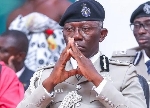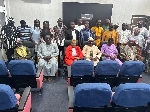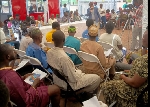"Internet shutdown not an option for Ghana"
 Communication Minister Ursula Owusu-Ekuful
Communication Minister Ursula Owusu-Ekuful
The Ministry of Communication has said shutting down the internet is not an option for Ghana.
In the minister’s closing remarks at the 8th Annual Freedom Online Conference at the Kofi Annan International Peacekeeping Training Centre in Accra on Friday, 7 January 2020 read by her deputy George Andah, Mrs Ursula Owusu-Ekuful said: “The issue of internet shutdown was discussed intensively in session 6 as a problem with a rising frequency which is taking place in many countries and a range of ideas from different stakeholders on how to address this trend were put forward.
“Unfortunately, just yesterday, we witnessed a section of the media misreporting the speech delivered by the Hon. Minister about Ghana’s position on internet shutdowns and content regulations. I wish to re-affirm this: Internet shutdown is not an option for Ghana!”
He said the discussions raised and issues addressed in sessions 7 through to 10 centered on human rights and the United Nations Open-Ended Working Group on Cyber’s mandate, emphasising the importance of ensuring that human rights and security are seen as mutually reinforcing while noting the need for greater clarity on how international law applies in cyberspace, and the importance of meaningful stakeholder engagement.
“The range of impacts that disinformation can have on human rights, such as freedom of expression and the right to health, as well its ability to polarise society and create distrust were raised together with a range of responses that should be considered by different stakeholders to counter disinformation, agreeing that respect for human rights is a critical precondition”, Mr Andah noted.
Read Mr Andah’s full speech below:
CLOSING REMARKS BY THE MINISTER FOR COMMUNICATIONS, REPUBLIC OF GHANA, HON. MRS URSULA OWUSU-EKUFUL (MP) AT THE 8TH ANNUAL FREEDOM ONLINE CONFERENCE AT THE KOFI ANNAN INTERNATIONAL PEACEKEEPING TRAINING CENTRE (KAIPTC).
TESHIE – ACCRA
FEBRUARY 7, 2020
11.30 AM
Your Excellencies, Ambassadors and Government Representatives
Representatives from Civil Society
Distinguished Delegates
Ladies and Gentlemen.
On behalf of the President of the Republic of Ghana, H.E Nana Addo Dankwa Akufo-Addo and the people of Ghana, I will like to thank you all for a culmination of what I believe has been an intense couple of days filled with numerous activities aimed at shaping our thoughts and ideas about digital rights and internet freedom. I envision that what we have dialogued on during this conference will play an instrumental role in influencing ICT policies and laws in our countries especially when it comes to issues of digital rights.
Ladies and Gentlemen, at the formal opening of the Conference yesterday, we saw the launch of the Digital Inclusion statement jointly developed by the Government of Ghana and the Federal Republic of Germany as well as participated in some interactive sessions and panel discussions on key areas. There were panel discussions that focused on challenges of securing the integrity of electoral processes and countering disinformation campaigns, the different ways that international human rights standards and the rule of law can be embedded in the governance of Artificial Intelligence, issues and challenges relating to online content moderation, the problem of child sex abuse imagery online, and growing trend of internet shutdowns in some countries.
Key issues that proved paramount in sessions 1 and 2, were the need to deploy effective solutions to minimise interference in elections, such as fact-checking services, digital literacy programmes and product-level innovations that help prevent the spread of mis- and disinformation as well as understanding the scope and use of Artificial Intelligence and its relations to protecting human rights.
In the context of content moderation online, session 4 discussed the drafting of a new Cybersecurity Bill by the government of Ghana which expected to address gaps in the legal framework, consistent with the government’s commitment to human rights online, albeit with many participants raising concerns that similar legislation in other states has led to restrictions on freedom of expression.
We are taking such concerns on board as part of our commitments to hold the founding principles and ideas of the Freedom Online Coalition. This session also saw the efforts some social media platforms had made to increase transparency over content moderation, to invest more in people and technology, and to engage with a broader range of stakeholders when developing their policies.
There was also a Child Online protection session which addressed emerging issues such as online grooming and live streaming and the risks of legitimate material being removed from the internet by automated processes through organisations that manage illegal content around the world.
The issue of internet shutdown was discussed intensively in session 6 as a problem with a rising frequency which is taking place in many countries and a range of ideas from different stakeholders on how to address this trend were put forward.
Unfortunately, just yesterday, we witnessed a section of the media misreporting the speech delivered by the Hon Minister about Ghana’s position on internet shutdowns and content regulations.
I wish to re-affirm this: Internet shutdown is not an option for Ghana!
Ladies and Gentlemen, the discussions raised and issues addressed in sessions 7 through to 10 centred on human rights and the United Nations Open-Ended Working Group on Cyber’s mandate, emphasising the importance of ensuring that human rights and security are seen as mutually reinforcing while noting the need for greater clarity on how international law applies in cyberspace, and the importance of meaningful stakeholder engagement.
The range of impacts that disinformation can have on human rights, such as freedom of expression and the right to health, as well its ability to polarise society and create distrust were raised together with a range of responses that should be considered by different stakeholders to counter disinformation, agreeing that respect for human rights is a critical precondition.
Participants in sessions 11 and 12 shared experiences from different countries relating to surveillance, outlined challenges, and discussed recommendations on providing effective oversight of state surveillance activities and saw the launch of the “digital safety manual”, which focused on diplomats and embassy staff working with civil society with concrete guidance on how to protect digital safety.
Ladies and Gentlemen, this morning, sessions on Human Rights Impact of Cybersecurity Laws, practices and policies, Social Media, Conflict and Violence, Data Protection and Digital ID Systems and the Architecture of Global Internet Governance were organized. These sessions collectively sought to identify and address critical issues pertaining to social media and data privacy of individuals.
I trust that all what we have discussed in the past three days will be instrumental in addressing some of the issues of internet freedom that plague us. I also believe that we have developed significant pathways aimed at ensuring a rights-respecting framework for Internet freedom.
I wish to reiterate my appreciation to all FOC governments, the FOC Support Unit, the Friends of the Chair as well as the FOC Advisory Network for a job well done.
Also wish to express my appreciation to the staff of the National Cyber Security Centre for the good work in organizing the event.
I say Ayekoo to all of you.
To conclude, to those who have visited before, I hope you will take time to explore the beauty of our beloved Ghana and to those visiting for the first time, I hope you have enjoyed a wonderful time and that this will not be your last.
Thank you
Source: ClassFMonline.com
Trending News

Gov't invites proposals from private partners to complete Saglemi housing project
13:53
'No one above the law!': Court orders CID boss' arrest for 'blatant' disregard of summonses
01:47
I’ll make Tano North the middle class hub in Ahafo region – Gideon Boako
13:56
PNC's cracks deepen as 11 of 16 national executive members resign to form new party
13:50
Mahama to form joint army-police anti-robbery squads to safeguard 24-hour economic activities
19:38
Gideon Boako empowers artisans and apprentices in Tano North constituency
13:57
Man held for robbing late vice president's widow of ₵28,000, £50, and $2,200 at gunpoint
13:06
New F. Alpha and Omega Specialist Hospital offers free healthcare to locals in Accra
14:59
I'm against LGBTQ; no ifs or buts, no shades of grey - Bawumia
11:50
Fuel prices up: Petrol, diesel sell at ₵14.99, ₵14.80 per litre
11:49



